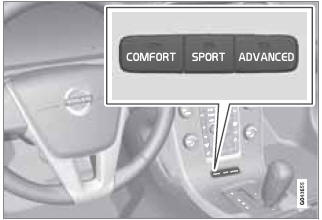Volvo XC60: Active chassis system–Four C
Active chassis (Four C)
Active chassis, Four-C (Continuously Controlled Chassis Concept), regulates the characteristics of the shock absorbers so that the car's driving characteristics can be adjusted.
There are three settings: Comfort, Sport and Advanced.
NOTE
This system is available on Canadian models
only.
Comfort
Comfort mode offers a somewhat softer ride and the transmission shifts gears at lower rpm.
This mode is particularly suitable for long-distance highway driving. The indicator light in the button will be on when this mode is selected.
Sport
In this mode, the vehicle's body sway is reduced during cornering and steering response is more immediate. The transmission shifts up at higher rpm for sportier driving. The indicator light in the button will be on to indicate that Sport mode has been selected.
Advanced
In this mode, body sway in curves is minimal and steering response is very direct. Gear shifting is done at high rpm in each gear for dynamic and active driving.
Operation

Chassis settings
Use the buttons in the center console to change setting. The setting in use when the engine is switched off is activated the next time the engine is started.
Speed-dependent steering force
Steering force increases with the speed of the vehicle to give the driver enhanced sensitivity.
At low speed the vehicle is easy to steer in order to facilitate parking, etc.
Steering force can be changed under MY CAR
 Car settings
Car settings
 Steering wheel force.
Steering wheel force.
Select Low, Medium or High. For a description of the menu system, see page 133.
NOTE
This steering force level menu function cannot
be accessed when the vehicle is in
motion.
See also:
Storage compartment
These compartments can be used to store small items required by the driver or
passengers.
NOTICE • To avoid possible theft, do not leave valuables in the storage compartment.
• Always keep the storage compartment covers closed while drivin ...
Parking Brake
Before leaving the vehicle, make sure that the parking
brake is fully applied. Also, be certain to leave the
transmission in PARK.
The parking brake lever is located in the center console.
To apply the parking brake, pull the lever up as firmly ...

 Stability system
Stability system